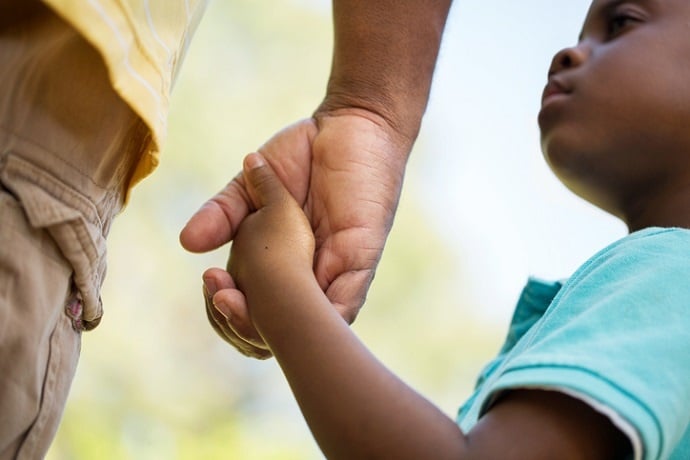
Thola, who was adopted by her white parents when she was a few days old, says there is no record of her biological family and she doesn’t really feel pressured to find them.
She feels that she is “culturally South African” but would like to know what she was exposed to in the womb. “I think what I am moved by is the fact that it’s a culture that I don’t know.”
Her biological family is culturally Tsonga, and although the Tsonga people originated from Limpopo Thola was born in KZN where the border meets Mozambique, so there are Tsonga people also in Mozambique.
Must read: OPINION: The new proposed adoption law Is NOT in the best interests of our children
“I do want to know more about Tsonga culture”
“It could be interesting to go back to that area and just see what my heritage is. I’m not pushed because I want to know ‘my people’, but I do want to know more about Tsonga culture,” she says.
Thola says that she didn’t really realise that her family was different until it was made obvious to her by people outside of the family: “I was little, so I didn’t realise what people were thinking. Only when we were approached and people said what they were thinking or seeing, did it become apparent to me”
“I didn’t even really know that there was anything ‘wrong’ with my family”
“Something I’m very aware of is that for a child, your world is the world you exist in. You don’t understand or think about anything outside of that world until someone plants a seed. So I didn’t even really know that there was anything ‘wrong’ with my family until people started asking strange questions,” she explains.
It doesn’t happen so much now that she’s an adult, she says, but people were always inquisitive and wanted to know what this picture was that they were seeing.
Must read: Adoption brings hope: Two SA families share their stories
“It definitely happened more when I was a child. People always looked. People always try and see what’s happening and why is this black kid with these white parents. There were definitely times when people thought I was a young domestic or my father’s girlfriend. It was a hot mess.”
Words like “normal” or “wrong” is language that was given to her by other people says Thola. “For me, my family is completely normal. There is nothing wrong with the structure of my family or what we look like.”
“No, no, this is crazy”
She says people were confused about her family and they would say things like “No, no, this is crazy. No, white people must have white children and black people must have black children. And if you are black, you must be poor and stupid. That’s what we know and that’s what you must be.”
“People literally thought it was wrong that a black child could talk back to a white child or a black child could disregard a white parent’s command as children do. But people were looking at this and thinking ‘but the white person is the master and the black person is the obeyer’ or whatever. And so people didn’t like what they were seeing.”
Thola was never angry about people’s reaction to her family, but she was always confused. She didn’t understand how anyone could see something that simply wasn’t there.
Also see: WATCH: The moving moment a young girl was told she was being adopted
“I’m black and my parents are white. It was very obvious... ”
But now that she’s an adult, she’s met a lot of different people, spoken to many more adoptees and learnt many things. “I’m now able to understand that none of what people think about me is my fault, it’s just that their brains don’t allow them to expand.”
So when exactly did they have 'the talk' about Thola and her sister being different? Well, they sort of did and didn’t she says.
“So yes, we had conversations because I’m black and my parents are white. It was very obvious. It would have been really awkward to pretend I was their biological child. So we kind of had that conversation really young. But also no because they were white and I was black, it was known.”
“So it was just like ‘Yeah you’re adopted. We are white there is no way you could have come out of my stomach. And you came into our lives and now you’re our child and we’re your parents.’”
Thola is still very close to her mother - her father passed away two years ago - but she is happy with the way her family is, or was, and says that being adopted didn’t give her more of an identity crisis than the average black person.
Also see: WATCH: A single black dad shares his heartwarming adoption story
“I don’t know if the adoption has made it more exhausting. I think just being black in South Africa and in Cape Town is taxing full stop,” she says.
The only thing she’s bummed about? She jokingly says that it’s a pity she was adopted by non-wealthy white people and will never have any property or inherit any money because the stereotype isn’t true: white people who adopt black babies aren’t rolling in it.
Part two of Thola’s story will be coming soon.
Chat back:
Share your story with us, and we could publish your letter. Anonymous contributions are welcome.
Read more:
- Everything you need to know about adoption in 2018
- OPINION: Adoption amendments deny opportunity to most vulnerable children
- What you can do to make a difference this #WorldFosterDay




 Publications
Publications
 Partners
Partners











